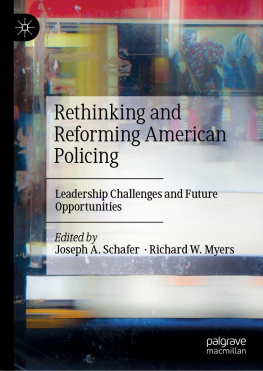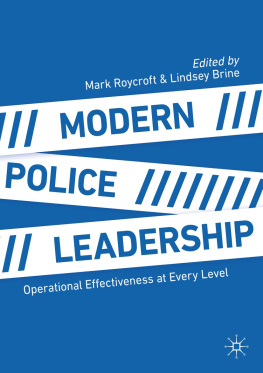First published in Great Britain in 2015 by
Policy Press University of Bristol 1-9 Old Park Hill Bristol BS2 8BB UK Tel +44 (0)117 954 5940 e-mail
North American office: Policy Press c/o The University of Chicago Press 1427 East 60th Street Chicago, IL 60637, USA t: +1 773 702 7700 f: +1 773-702-9756
Policy Press 2015
British Library Cataloguing in Publication Data
A catalogue record for this book is available from the British Library
Library of Congress Cataloging-in-Publication Data
A catalog record for this book has been requested
ISBN 978 1-4473-1572-8 Hardcover
ISBN 978-1-4473-2120-0 ePub
ISBN 978-1-4473-2121-7 Mobi
The right of Bryn Caless and Steven Tong to be identified as authors of this work has been asserted by them in accordance with the Copyright, Designs and Patents Act 1988.
All rights reserved: no part of this publication may be reproduced, stored in a retrieval system, or transmitted in any form or by any means, electronic, mechanical, photocopying, recording, or otherwise without the prior permission of Policy Press.
The statements and opinions contained within this publication are solely those of the authors and not of the University of Bristol or Policy Press. The University of Bristol and Policy Press disclaim responsibility for any injury to persons or property resulting from any material published in this publication.
Policy Press works to counter discrimination on grounds of gender, race, disability, age and sexuality.
Cover design by Qube Design Associates, Bristol
Front cover image: xxxxxx
Readers Guide
This book has been optimised for PDA.
Tables may have been presented to accommodate this devices limitations.
Image presentation is limited by this devices limitations.
Here is a very short glossary of the most common terms, abbreviations and acronyms used in the EU. If they occur in the pages that follow, they are again explained at first use.
acquis (French) A difficult term to translate for all its widespread use in Europe. It means something like the heritage of accumulated knowledge and has special resonance in policing experience. Policing acquis can be used to suggest insider knowledge or the kinds of insight that come from long policing experience
ACPO The Association of Chief Police Officers (England and Wales); was the national voice of chief police officers until December 2014, when public funding was withdrawn. Replaced by the National Police Chiefs Council in January 2015
agents (French) police officers in the Police Nationale
Common Market Term descriptive of the European community in the 1970s and 1980s; the commonality of trade and the formation of a customs union were (and still are) features of unification in Europe
corpus juris In full, corpus juris criminalis , the body of criminal law. This is a commonly used term in the EU which reflects an aspiration, particularly on the part of strategic police leaders, to have an integrated criminal law operative across Europe (and probably supplemental to, rather than a replacement of, national criminal laws)
CEPOL European Police College
CSCE Conference on Security and Cooperation in Europe
democratic deficit A contested term, used to suggest that the EU is largely governed by officials and is not subject to the (rather inert) European Parliament in the same way that democratic nation-states are subject to their national parliaments (Bache et al, 2011, p. 67)
EAW European Arrest Warrant
EC European Commission: the body of European officialdom largely based in Brussels. The term was once used to describe the European Community (forerunner term for EU )
ECHR European Convention on Human Rights
ECJ European Court of Justice
ENISA The European Union Agency for Network and Information Security founded in 2009, intended to coordinate investigations into, and prevention of, cybercrime
EU European Union
Euro Currency common to most but not all EU countries
EuroGendFor European Gendarmerie Force (also EGF). The gendarmeries of Europe constitute a potent militarised police presence and consist of the French Gendarmerie , the Italian Carabinieri , the Spanish Guardia Civil , the Portuguese Guarda Nacional, the Dutch Koninklijke Marchausse , the Polish andarmeria , the Lithuanian Vieojo Saugumo Tarnybaand and the Romanian Jandarmeria. The Turkish Jandarma was granted observer status in 2009
Eurojust European Judicial Cooperation Unit
Europol European Police Office
Frontex European Agency for the management of external borders
FSB The Federal Security Service of the Russian Federation
gendarmeries A militarised form of policing developed by Napoleon from the provost role. Modern gendarmeries tend to police rural areas, undertake public order duties and royal or VIP protection
GODIAC Acronym for good practice for dialogue and communications, which started in 2010 and is an EU-wide initiative for understanding crowd control in political demonstrations
Gold A policing concept borrowed from the military, which designates in Gold, Silver and Bronze the respective layers of command in an incident or operation. Gold is strategic police leader level
IPCB Independent Police Complaints Body
JITs Joint Investigation Teams
juge dinstruction This is the active role of a member of the judiciary in investigation of (usually) serious crime; the juge directs the court proceedings and questions the accused
MOPAC The Mayors Office for Policing and Crime in London
MPA The Metropolitan Police Authority which MOPAC replaced
MPS Metropolitan Police Service
OLAF European Anti-Fraud Office
OSCE Organisation for Security and Cooperation in Europe
PCSO Police Community Support Officer; introduced in England and Wales in 2002 this is a lesser role than warranted police, confined mainly to neighbourhood patrols and dealing with non-criminal nuisance
Public prosecutor A career lawyer, this person instructs the police what to investigate, what evidence to look for and whom to question. In Scotland, the Procurator Fiscal performs a similar role
RABIT(s) Rapid Border Intervention Team(s)
Region To reinforce the anonymity of our respondents, we have used European regions rather than individual countries as markers. The regions are Baltic: Estonia, Latvia, Lithuania; Benelux: Belgium, the Netherlands, Luxembourg; British Isles: England, Wales, Scotland, Northern Ireland, Isle of Man, Republic of Ireland; Nordic: Sweden, Norway, Finland, Denmark, Iceland; Alpine: Austria, Switzerland, Liechtenstein, Slovenia, Germany; Central Europe: Poland, Czech Republic, Romania, Slovakia, Hungary; and the Mediterranean: Portugal, Spain, France, Monaco, Italy, Croatia, Bosnia and Herzegovina, Montenegro, Albania, Greece, Turkey, Cyprus, Malta and the British territory of Gibraltar
rightward shift A term used to describe the increased representation of right-wing political movements in the May 2014 European elections, including groups such as the French Front Nationale , the Greek Golden Dawn and the UK Independence Party (UKiP)






